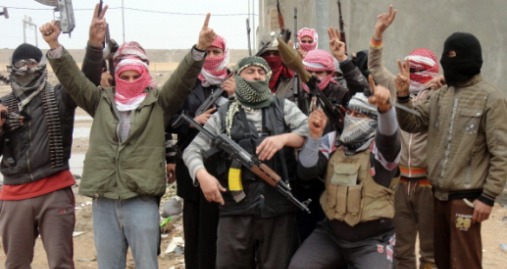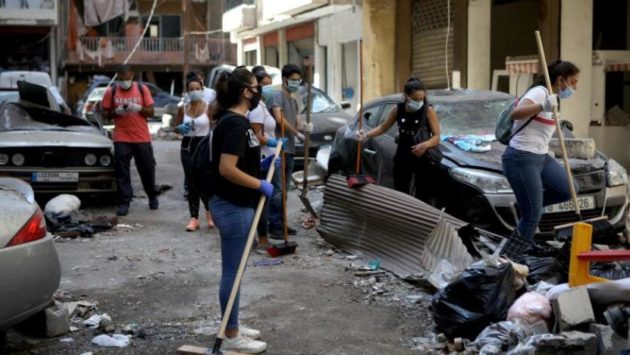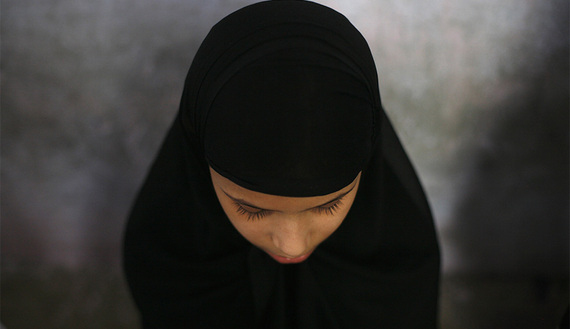Stuck Between Extremist Rocks and Militias’ Hard Place, Iraqis on Frontlines’ All Spies and Traitors’
There are daily battles between pro-government forces in Iraq and the extremist Islamic State group. Trapped in the middle are locals who didn’t leave their homes for one reason or another. Besides the dangers of nearby fighting and food and fuel shortages, the locals say that both sides believe they are traitors or spies.

Last week, a video clip was widely circulated by Iraqis on social networking websites. In the video an old man living in a village north of Baghdad is talking to members of the extremist group, the Islamic State. In it the old man praised the fighters from the Islamic State, or IS, group and cursed the Iraqi army and the Shiite Muslim militias that were fighting against the IS group.
Only days after the video appeared, the Iraqi regular army and the Shiite Muslim militias fighting alongside it, managed to get the IS group out of that particular area. Members of one of the militias arrested the old man as a traitor and collaborator with the IS group. Later on another video appeared where the old man was interviewed by members of a Shiite Muslim militia; in it, he said that the IS fighters had forced him to say the bad things he said in the earlier video.
These videos very clearly demonstrate the precarious situation that locals living in cities and towns on the frontlines are in. The two groups fighting one another – the Sunni Muslim extremists and the mostly Shiite Muslim militias, plus the regular Iraqi army – both say that locals in these areas are traitors and spies,agents of their enemy. At the same time, locals living here are also victims of shelling, in danger of arrest by either group and blocked by any siege imposed on their areas.
And it’s not like there is just one frontline. There are many areas where the extremists are fighting the army and militias, extending from the province of Anbar in the west up north to Mosul and Salahaddin and east to Diyala. Thousands of Iraqis see battles happening on their doorsteps because they chose to stay at home. Many of them did not stay at home because they supported one or other group; rather they didn’t want to become refugees. Some even left their homes at first but given the uncomfortable life ahead for displaced locals, decided to return home. Of course, one cannot deny that some also practically support the fighters occupying their towns. But it is very hard to tell which locals are there for which reasons – and for some, it may be even more of a grey area. There are certainly also locals who may have welcomed the IS group at first but who prefer they were not there now, but who are now trapped.
Fighting has been going on daily for months now and it is exhausting the combat capabilities of both sides.
“There are about 30 different battle fronts with the IS group around Iraq and there’s heavy fighting there on a daily basis,” says a senior officer at the Ministry of Defence, who could not be named because he was not authorized to talk to the media. Most of the fighting takes place in populated areas because locals often refuse to leave their homes for any number of reasons. “Additionally the IS group is forcing some people to stay in their homes because they want to eventually use them as human shields,” he added.
Regarding the accusations made about ill treatment of locals at the hands of pro-government forces, the officer denied this. “The army doesn’t do such things,” he said. “It is the militias that come with the army that are behaving like this. The army simply takes all measures necessary to identify the members of the IS group who may well be hiding among locals left behind. Everyone knows that most of the IS group is made up of Iraqis.”
Karim al-Nasiri is a farmer living in the Taamim area in Baiji, Salahaddin province – control of the area has been disputed for a long time now. “When the IS group controls this area it treats all the people as though they are traitors even though we are all Sunnis,” al-Nasiri told NIQASH. “In fact, the extremists arrested and executed a number of people in this area because they said they were spies for the government. Then last week, the IS fighters fled and Iraqi security forces entered the area. But they think we are traitors too and that we are all working for the IS group, because we’re Sunni. Neither group trusts us.”
Al-Nasiri also explains that often the IS group will keep their prisoners in former government buildings, like universities or council buildings. “They put their flag on the roof to make the aircraft of the international coalition think they’re inside,” he notes.
And the IS group has used this move strategically. In one incident where coalition aircraft bombed a Mosul prison, there were dozens of former security staff – local policemen and army officers – detained inside. They were being kept there because the IS group said they were spies for the government. When the building was bombed and locals killed or injured, the IS group made good use of the incident to stir up further resentment among locals against the government and the international coalition.
Majid al-Obeidi lives in the Buhriz district in Diyala province and he says that the area is a constant battleground – the IS group and the Shiite Muslim militias are fighting here all the time. They conduct what he calls “al-kar wa-l-far”, a tactic involving attack and then withdrawal as practised historically by Arabian cavalry.
Al-Obeidi’s brother was abducted by Shiite Muslim militias in the area because he refused to let the militiamen search the house before his wife and daughters had left the home. “Both groups, the IS group and the militias, treat people very badly,” al-Obeidi says. “Both consider all the people here to be traitors and spies.”
Locals living in these frontline areas don’t only have to worry about how the different fighters will treat them. Usually there is also a lack of water and electricity as well as the absence of any municipal services. But the biggest issue is usually that of being blockaded into the area, which means they can’t even leave to get food or fuel back home.
“We had almost run out of food,” Naim al-Dulaimi, one of the tribal leaders in the Khalidiya area, east of Ramadi city in the province of Anbar, told NIQASH; the area is still under the control of the Iraqi government forces. “And we wanted to get out of the area – just to get some food. But the Iraqi army had imposed a blockade and we weren’t allowed to leave.”
Meanwhile in another part of the area, al-Dulaimi says the IS group has a blockade. The extremists intend to use the locals as human shields, he suggests. “And we’re now also suffering a shortage of medical supplies.”




